- Home
- Andrew McGahan
The War of the Four Isles Page 9
The War of the Four Isles Read online
Page 9
Dow spun, and so beheld finally, entering from the terrace and framed by the bright daylight beyond, Damien Tender, legendary high commander of the Twin Isles, liberator, and challenger of empires.
And indeed, befitting such titles, Dow’s first impression of the man was of size and power. The War Master was not young – he could not have been less than sixty – but he was robust yet, solid and barrel-chested, well over six feet tall, and clad in a striking black uniform that scarcely seemed to contain him; a palpable physical presence.
In response, there was hurried movement around the table to rise, but already the War Master was sitting down, waving a hand. ‘No, I’m the one who’s late. I was delayed by an urgent message – in fact, it will be of interest here. It seems our Ship Kings prisoner has contrived to take his own life. Hanged himself in his cell, I’m told.’
A shocked instant passed at this news. Then Constance Reed said, ‘That should not have been allowed. His guards have been inexcusably careless.’
‘Assuredly. But I will not pursue the matter. His life was forfeit in any case.’ And with that, Damien Tender turned to consider his guests. ‘Thank you all for coming,’ he said in greeting. ‘Especially in such heat. It’s hard, I know, on newcomers.’ He glanced at the ceiling. ‘At least in here we have these mechanical fans. They were a gift from the Ironmongers. If you’re wondering, they’re driven by a small engine hidden in the ceiling. A shameful waste of iron and oil, of course, but I didn’t think it right to refuse.’
His voice was thick, with a heavy Twin Islands accent; slow, yet compelling to the ear. And while his face was almost ugly – large-jawed, heavy browed, the nose all but square – the effect instead was of strength. But it was the War Master’s eyes that defined him. They were lined with weariness, as if from long years of overwork, but they were large and dark, and filled with a piercing, inarguable sincerity.
‘Speaking of the Ironmongers,’ he went on, with a nod to Johannes, ‘my thanks, Blacksmith, for your report on the new Ship Kings weapons. I spoke with the Guild this morning and they have already designed and built a prototype cage that will protect a boat’s propeller from becoming fouled in the nets.’
Johannes nodded respectfully in return. ‘I’m glad to hear it, War Master.’
The dark eyes now shifted to Captain Fletcher, esteeming. ‘And to you, Captain, my gratitude as well. It’s been a thankless task, I know, to patrol the Reach when great battles are being fought elsewhere. Thankless – but necessary, as the very events that bring you here prove.’
‘I serve where I’m sent, sir,’ was Fletcher’s stiff reply. ‘No complaints.’
‘No. But I feel the keenness in you to test your ship in sterner ways. Well, we’ll see, for that’s the business at hand, is it not?’ An iron-grey eyebrow rose enquiringly. ‘Dow Amber here has told you what it is he’s come to request of me, hasn’t he?’
The captain looked startled, then gave Dow an unhappy stare. ‘No, sir. I didn’t know he’d come to request anything of you at all.’
‘Ah, so the boy keeps close counsel. Good.’ The eyes, amused now, glanced at Dow then returned to the captain. ‘Well, let me inform you. He presents a bold proposal; namely, that we attempt a rescue of the Heretic Kings from Banishment, and if successful, that we deliver them to their homeland to foment civil war afresh in the Kingdoms – and he asks that I loan him a ship and crew to do it.’
The silence among the Snout officers was stunned. Fletcher, Agatha Harp, Jake Tooth and even Johannes all gazed at Dow as if he’d gone mad. But Constance Reed merely watched on, unperturbed; this was no news to her, of course. Or to Cassandra, but she was only staring down at the table, still – it seemed to Dow – oddly ill at ease.
‘My ship?’ Captain Fletcher asked finally, in an undisguisedly appalled tone.
‘That would depend on whether we send any ship at all,’ answered the War Master. ‘Oh, the merits of the proposal are evident enough; our reports indeed suggest that the Heretics, if freed in timely fashion, could well challenge for power in the Kingdoms. But can they be freed? Of that I’m less certain.’
Abruptly, he put his hands flat on the table and levered himself to his feet, then took a stride to the giant map hanging on the wall.
‘Banishment,’ he announced, stabbing a blunt finger to indicate the isle in question. It was marked as a tiny dot, a speck of land at the centre of the long chain of reefs that arced south from Great Island, enclosing the Golden Millpond. ‘The most infamous prison in all the world. Not a jail for common criminals, mind, but rather a place of exile for deposed Ship Kings royalty and nobility. For half a thousand years it has served as an unwelcome home to noble dissidents and disgraced princes from all across the eleven kingdoms. And as their graveyard too, for to our knowledge, no one has ever escaped from there.
‘Which is not to say that the prison itself is any dark dungeon or towering fortress. By repute, the accommodations on Banishment are in fact quite comfortable, and the guard not heavy. If a ship of ours were to indeed land on the isle, it would require no great force to free the prisoners. The problem lies in making a landing at all – for Banishment’s true defence lies in its inaccessibility.’
Constance Reed spoke. ‘War Master, the problems begin well before attempting a landing. To come even within a hundred miles of Banishment would be an act fraught with peril, for it would mean sailing deep into enemy waters. How would you intend it be done?’
Damien Tender pondered a moment, then, taking several steps to do it, traced a long line eastwards across the map from the Twin Isles all the way to the waters off the west coast of Great Island. He glanced at Captain Fletcher. ‘What are your thoughts on such a course, Captain?’
‘Sir,’ Fletcher replied, having regained his composure, ‘it’s one thing to run a finger across a map, but the Mistress Superior is correct; the sea between here and the Kingdoms is rife with enemy ships, and the waters around Great Island itself are as heavily patrolled as our own shores. If you sent a fleet it might break through in strength, but only after battle, and it could hardly then hope to come to Banishment unannounced – and yet the rescue must come unannounced, or surely fail.
‘So I assume you would mean this mission to be one of stealth. In which case, you would send just one ship, striving to slip through unnoticed to the prison isle. But that option too is hazardous. A single ship may all too easily fall victim to sea harm – and should any enemy patrol happen upon it, it would be quite defenceless alone.’
‘Yes, yes,’ the War Master mused, his gaze roaming about the map. ‘The Ship Kings are no fools. They are alert to sneak attacks from their west – and from their north and south too. It’s only to their east that their vigilance lessens somewhat, and only because we’d never . . .’ But here he paused, and stepped back from the map, as if to consider it from a wider perspective. ‘And yet . . . for a purpose such as this, and a single ship . . .’
‘Sir?’ asked Fletcher.
In answer, the War Master traced another line, but this time it led west from the Twin Isles until it ran off the map. He then walked to the map’s opposite end, and resumed the line from that edge, still westwards, until it reached the east coast of Great Island.
Silent, he smiled in inquiry at the table.
For a moment Dow only gazed at the map uncomprehending. But then the import of the War Master’s gesture dawned; for of course there was an entire ocean that the map did not show. That was the Outer Ocean, the great empty sea that lay between the Twin Islands and the Kingdoms if a ship sailed west around the world, rather than east across the familiar Middle Sea.
Captain Fletcher’s face had fallen. ‘Sir, you can’t seriously propose that you would send a ship the long way around, across the Wilderness?’
Dow could appreciate the captain’s dismay. There was a reason most maps excluded the Outer Ocean: there was nothing in that ocean for a map to record. It was the empty quarter of the world; a vast watery waste devoid
of even the tiniest isle; a sea wider than the Middle Sea by many weeks of sailing, and made wider still by terrible storms and opposing winds and contrary currents – and by even worse things, if legend was to be believed . . .
‘Why not?’ countered the War Master, a light in his eyes. ‘It’s a sea to be crossed like any other. It’s been done before, after all, by mariners of old. Courage, and a steady hand at the wheel, are all that’s needed.’
‘Aye,’ said Captain Fletcher, ‘it’s been done before. But not for many years, nor by any ship of ours – and for good cause. Even in wartime it’s too reckless a route; fickle winds and waves, and black deeps, and things that rise from the deeps. And for this business now it’s too slow! It would take a ship twice as long to reach the Kingdoms – if it reached them at all.’
Damien Tender was unmoved. ‘Better a slow voyage to success, hidden from our enemies, than a swift voyage straight into their hands.’
‘You’d not send a fleet this way.’
‘A fleet? No. A fleet would never hold together over so capricious a sea, and dispersal is deadly, as we have seen in this war already, to our loss. But a single vessel has no such concern. No, on that much I’m decided – if a ship was to go at all, with secrecy to be its best hope, then I would send it by the Outer Ocean.’
Captain Fletcher threw up his hands. ‘Very well. But even if a ship should cross the Wilderness in one piece, and so come to the Kingdoms undetected – what then? It would still be unable to approach Banishment or to land there!’
‘Yes,’ agreed the War Master, ‘that really is the puzzle, isn’t it?’ He turned once more to the map, and the tiny dot of land. ‘Consider the dilemma. To the north of Banishment are the waters of the Millpond, native ground to the Ship Kings home fleet. More enemy vessels patrol there than anywhere else in the world, so a rescuer could never hope to approach Banishment that way. But to the east and west the way is equally blocked by the Chain Reefs, amid which the prison isle itself sits. And let no one delude themselves: no path has ever been found through the Chain Reefs – they are not a labyrinth but more akin to a solid wall. Which leaves only an approach from the south – and there lies the least hope of all.’
On the map, his heavy finger now slipped below the dot of Banishment. There, the deep blue of the ocean paled to a yellowish green, a wide band of colour that spread far to the south.
‘The Banks,’ intoned Damien Tender. ‘Long a name of foreboding to sailors. Here are no reefs or enemy fleets, but something even deadlier – shallows; shifting banks of sand and mud, bare at low tide and fetid with sucking quagmires, but covered deep at other times with madly rushing currents. For that is the peril of the Banks: the magnitude and strength of the tides that ebb and flow there, across hundreds of miles of sea. Why, a ship can ride in five fathoms of water one moment, and a scant hour later be aground in quicksand. Nor is there any predicting when the tides will rise or fall. No, Banishment fears no attack from the south, for not even the most foolhardy captain would risk his vessel there.’
The War Master turned and for the first time addressed Dow directly. ‘So tell us, Mr Amber, Young Admiral and rider of maelstroms – how do you propose to gain the prison isle, should a ship ever be sent? If all ways are shut – north, south, east and west – how can it be done?’
The questions were delivered as a challenge – but there was no mockery in Damien Tender’s dark, somehow liquid eyes; only an earnest probing, as if fully trusting that Dow must have an answer.
‘Sir,’ said Dow carefully, aware that his moment had come, ‘the Millpond and the Chain Reefs I agree offer no hope. But the Banks – the Banks may be different. I know legend declares them impenetrable, but I have myself passed through regions likewise known to be impenetrable – much as you have done yourself, if the stories I’m told are true, when you unravelled this Labyrinth.’
The War Master blinked, his gaze hardening. ‘You compare your adventures amid the Ice to the discovery of the Atoll? If so, you know little of the suffering involved for those of us who first sought after this place.’
‘I know little indeed, sir, because little is ever told of it, by your own order,’ Dow dared to remark, to widened eyes about the room.
But Damien Tender smiled thinly, and the danger went from his gaze. ‘A fair point. Then I will tell you that it was not by chance, nor by the following of a whale, as I have heard legend claim. No, the maze was pierced only by dint of hard work over many years and many fruitless voyages, searching out the ways, and learning how to read the clues of currents and winds.
‘You suffered in the cold north, I don’t doubt, but heat and thirst are even worse ills. Our expeditions were a slow agony of them, endured only out of the despair that inhabited us in those days, doomed as we were to Ship Kings rule. Many of us died. But the Labyrinth was solved, Dow Amber, because we committed ourselves to do it.’
‘Good,’ said Dow, encouraged. He’d actually been worried that maybe the myths were true, and that it was only by some freakish or magical chance that the Labyrinth had been breached, rather than by human patience and skill. ‘Then one of your pilots could use exactly those talents to find a way through the Banks – if you give me loan of one.’
‘What?’ said the War Master.
Dow hurried to explain. ‘After all, the Banks don’t sound as deadly as the Labyrinth. There are no reefs to puncture a hull, and if a ship gets grounded on the sand for a time, it can float off again when the water returns. Which leaves only the matter of reading the currents. Difficult – but, as you say, there are no finer readers of currents than your Labyrinth pilots. If we dared such an unexpected path, we could come unseen right to the southern shore of Banishment itself. Give me a ship, War Master, and it can be done.’
Damien Tender stared in stony surprise, then threw his head back to laugh. ‘Oh, well done, lad. Well done. You skewered me there, hard on my own harpoon! Get me to brag about how good my Labyrinth pilots are – and now how can I say that they couldn’t do what you ask? Oh, very clever indeed.’
But the Mistress Superior did not seem to find it so clever. ‘War Master, against all law, you would send a pilot out beyond the Labyrinth, where he stands the risk of capture by the enemy? Why, you would imperil the very security of the Atoll itself.’
‘Peace, Connie,’ said Damien Tender. ‘If worst came to worst, a pilot always has his vial of last resort. But I did not say that I will send anyone yet.’ He turned. ‘In particular, I have not said that I will send you, Dow Amber. Indeed, the Mistress Superior and I have long discussed what is to be done with you, and even if we do send a ship, we are inclined to refuse you passage on it.
‘Now,’ he said, raising a hand as Dow bridled, ‘hear me out. It is a question of your proper place. I gather that one of the Banishment prisoners is a friend of yours, and that you desire to help her, but in truth your presence would add no vital strength to the mission. It is on New Island that you belong.’
Now Constance Reed took up the argument. ‘As I was saying earlier, a crux is fast approaching in your homeland. The next summer will be decisive. The Ship Kings must regain their access to New Island timber, otherwise they are lost. They will throw every ship they can muster at us in an attempt to dislodge our hold. There will be battle; perhaps the greatest battle of the war, for we will match them in defence. And if we achieve the victory, then it will also be the last great battle of the war, for the Ship Kings cannot survive a further year without timber supplies, while we of course will always have the Atoll.’
‘And have no doubt,’ uttered the War Master, ‘we will achieve the victory. I will go to New Island myself in the spring, with the fleet.’
This was met with a sound so unlikely that the room froze in surprise: a disbelieving laugh.
‘Master Harpooner,’ said Damien Tender softly. ‘You express scepticism?’
Jake Tooth shrugged, unawed apparently even by the presence of his supreme commander. ‘Why should I not? Ha
ven’t we been promised such a final victory every year since this war began?’
‘This time it is assured.’
‘How can you assure it? Can you summon a fleet twice the size of the one the Ship Kings will assemble? For that’s what we’ll need. Ship for ship we cannot beat them; only when we outnumber them do we prevail. Their vessels are faster than ours, their crews better trained, their navigators more skilled. It’s no shame to admit it, they have a century’s more experience at sailing and shipbuilding than we have. It’s simply a fact that must be faced. So I ask, do we have twice the ships that they do?’
‘We have ships enough,’ the War Master replied chillingly. ‘I don’t dispute your observations; I’ve heard them repeated many times. But we do not need to win the coming battle for New Island, we only need to not lose it. If the Ship Kings cannot drive us out, then they are finished. And they cannot drive us out. Better ships or not, they do not have enough of them to defeat us. We will hold our ground next summer, and deny them their timber, and within a further year we will be embarked upon the invasion of Great Island itself.’
Jake Tooth shrugged again. ‘A fine and bloody day that will be, no doubt.’
‘Aye, it will be a time of great reckoning,’ promised the War Master – and Dow glimpsed something black blooming in those already dark eyes, something merciless, and he remembered the tales of Damien Tender’s parents, murdered both by the Ship Kings when he was a boy.
The Mistress Superior resumed her interrupted address to Dow. ‘Your place next summer is in your homeland, to lead your people as they help us drive the Ship Kings’ armies from New Island for good. It is what you yourself have been demanding, and now the time has arrived. We had thought to send you there by spring. But that can’t happen if you go haring off on this folly to Banishment. So it’s impossible, you see. You must give up all hope of it.’

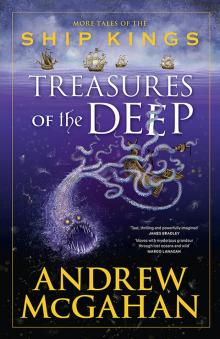 Treasures of the Deep
Treasures of the Deep The Rich Man’s House
The Rich Man’s House Praise
Praise The White Earth
The White Earth 1988
1988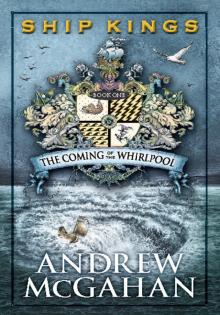 The Coming of the Whirlpool
The Coming of the Whirlpool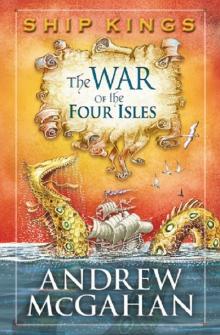 The War of the Four Isles
The War of the Four Isles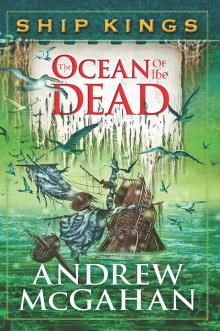 The Ocean of the Dead: Ship Kings 4
The Ocean of the Dead: Ship Kings 4 Last Drinks
Last Drinks Wonders of a Godless World
Wonders of a Godless World Underground
Underground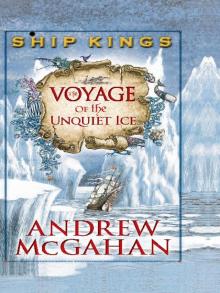 The Voyage of the Unquiet Ice
The Voyage of the Unquiet Ice